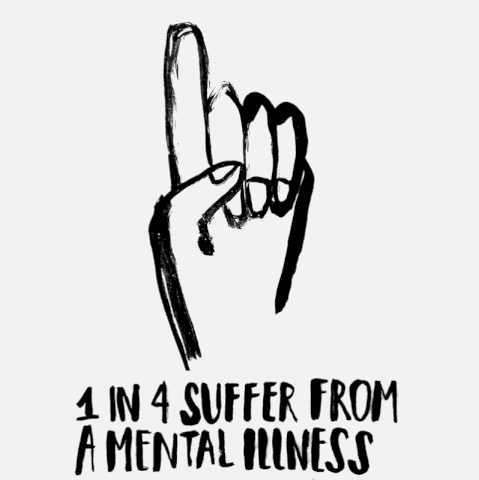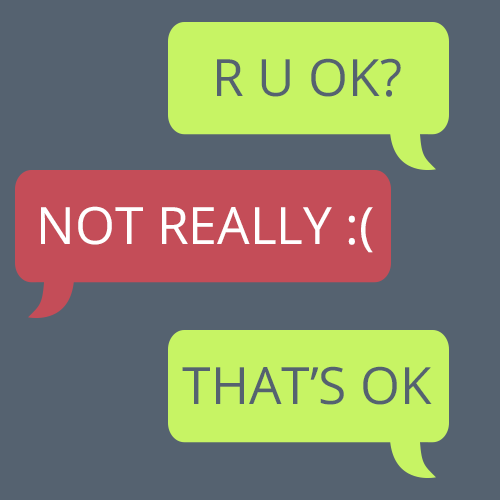How to deal with mental health problems at work
by Yellow

Work. It can be a fulfilling part of our lives. But it can also be the source of much stress. Some people learn to live with the feeling of being stressed out, running the risk of overlooking the long-term repercussions this may have on their mental health.
While stress is not an illness, it can lead to one. It is, in fact, a major contributing factor for a myriad of mental and physical health problems. According to the Healthy Mind Survey 2013-2015, 50% of companies in Malta with over 249 employees encountered more than 4 cases of mental health problems within the company over the previous 2 years. Over half, 54.7%, of the cases were of depression, 46.3% indicated stress and 23.2% involved anxiety issues.
With such figures, in a global context of increasing mental health issues, employers can no longer ignore this aspect of their employees’ wellbeing. We teamed up with the Richmond Foundation - a non-profit organisation committed to providing services in the community to people with mental health difficulties - who offered insightful information about how to go about supporting people with mental health problems at work.

THE EMPLOYER’S ROLE
Unlike bodily ailments, mental health issues are not visible. This is why, as an employer, one of the major things that can boost your team’s mental health is awareness training and education on the subject. Courses in Mental Health First Aid equip employees with just enough knowledge on what mental health is, what can go wrong, how to realise when it’s going wrong, and where to get help.
In addition to such training, a form of EAP (Employee Assistance Programme) is also paramount. An EAP connects employees to confidential, professional assistance to help with personal, family and work issues. This provides employees with an easy way to access professional support in a confidential manner, without the need to speak to management or HR beforehand. In fact, Richmond Foundation offers a Staff and Organisation Support Programme which runs similarly to an EAP.
Apart from assuring your employees that they are being cared for, an effective EAP programme offers them better access to professional support. The EAP can also be used as a referral tool by employees who are appointed as Mental Health First Aiders.
As an employer, it pays to help employees going through mental health difficulties. Once they receive the appropriate treatment, they will most likely respond with improved work performance as part of their recovery process. Investing time and support in retaining an experienced and skilled employee with mental health difficulties is usually more cost-effective than simply recruiting and training a new person.
WHAT TO LOOK OUT FOR
The first step towards supporting employees with mental health problems is understanding when there is an issue. Mental health problems at the workplace can manifest themselves in a variety of symptoms that can affect performance, typically due to problems with concentration, memory, decision-making and motivation. Signs and symptoms of mental health problems at work include:
Behaviours:
- Not getting things done
- Erratic behaviour
- Emotional responses (eg. crying bouts or anger bursts)
- Complaints about a lack of management support
- Fixation with fair treatment issues
- Complaints of not coping with workload
- Appearing withdrawn
- Reduced participation in work activities (in team buildings, staff parties, etc.)
- Increased consumption of caffeine, alcohol, cigarettes and/or sedatives
- Inability to concentrate
- Being indecisive
- Memory difficulties
- Loss of confidence
- Rapid mood changes
- Irritability
- Unplanned absences
- Conflict with team members/manager
- Use of grievance procedures
- Increased errors and/or accidents
Physical/physiological signs:
- Tired all the time
- Sick and run down
- Headaches
- Persistent/resistant body aches and pains
- Reduced reaction times
- Difficulty sleeping
- Weight loss or gain
- Disheveled appearance
- Gastro-intestinal disorder
WHAT TO DO
If you notice any of the signs above, it’s important not to jump to conclusions. Do not judge on what you see externally. It’s important to project the right attitude - Show that you are concerned and want to help, as opposed to letting your curiosity take over. Although this is easier said than done, with the appropriate training you can effectively support and refer your employee for help.

Before approaching the person:
- Plan what you want to say to them
- Be clear in your own mind about concerning behaviours you have noticed
- Plan an appropriate time and place to meet them
- Find out what resources are available in the workplace to support people with mental health problems (e.g. EAP)
- Be familiar with relevant laws and organisational policies and procedures, including ones about accommodating employees with mental health problems and anti-discrimination
- Be familiar with the guidelines on how to help someone in an emergency (eg. suicide crisis)
What to do while speaking with a colleague:
1. Start a conversation
– “I have been feeling concerned about you lately”
– “Recently I have noticed some changes in you and wondered how you are doing”
– “I wanted to check in with you because recently you seemed to not be yourself/down”
2. Express empathy
3. Ask the person how you can help
4. Tell them that they are not alone
5. Support them in seeking professional help
WHAT NOT TO DO
It can be just as important to know what NOT to say when speaking with a colleague. Sometimes it’s not about saying the right words, but about listening to the person and being there for them.
You should NOT:
- Start the conversation with the person by talking about how your struggles have affected your work behaviour
- Make the person talk about their mental health problem if they don’t want to
- Ask questions that create pressure like ‘What’s wrong with you?’ or ‘Are you stressed or something?’
- Rush in with another question without listening to the answer
- Diagnose the person with a mental illness or use diagnostic terminology, unless the person uses it
- Try to act as a counsellor, tell the person what to do, or offer the person remedies or treatments
- Be patronising, blame, accuse, treat the person as an invalid or embarrass them by saying things like ‘everyone is noticing…’
- Say ‘I’ve had the same experience’, unless you actually have
- Make assumptions about whether any of the person’s absence (such as when calling in sick) has been ‘genuine’
- Minimise the problems the person may encounter as a result of their mental health problems
Don’t say things like:
- It’s all in your head
- We all go through times like this
- Look on the bright side
- You have so much to live for, why are you feeling like this?
- I cannot do anything about your situation
- Just snap out of it or pull yourself together
- What’s wrong with you?
- Shouldn’t you be better by now?
- What do you want to take medication for?
- What do you want to go to a psychiatrist/psychologist for?
Know your limitations
When it comes to mental health at work, it would be naïve and overly-simplistic to look at it as a one-sided situation which occurs in the work vacuum. This issue is multi-factorial, and it almost always happens in connection to other events, people, and situations within the person’s circle.
When trying to assist a colleague or employee, always make sure to know what your limitations are. You might not have a full picture of what’s going on in their life. While you can help by supporting them and referring them to the help they need, remember - you are not a therapist! Some problems cannot be solved without professional intervention, so make sure you know when to refer to the appropriate support systems.
WHERE TO SEEK HELP

When it comes to help it depends on the person’s individual situation and problem. A colleague can encourage someone to check whether their organisation has an EAP in place. That way, they can access professionals through the programme.
Most of the time going to a GP is a good start for most people, as they are usually familiar with their GP and can access him or her easily. Other professionals could include psychiatrists (mostly when medication is necessary - this should not be the first person referred to, ideally the person is referred to a GP first), psychologists, psychotherapists, counsellors and social workers, just to name a few. Support groups are also a good place to seek guidance and support.
It’s always important to keep in mind that the person seeking help must be willing to go for help.
ADJUSTMENTS
At times, in order for the person to continue functioning at work, some adjustments can be made to enable them to still keep working whilst minimising the impact on their mental health.
What are reasonable adjustments or accommodations?
- Understanding the person’s limitations
- Focusing on their strengths
- Making small adjustments related to their tasks,role or shift-times
- Peer/buddy system
- Educating and creating more awareness and sensitivity among management and students
- Encouraging the person to get external psychological support if necessary (referral system)
HEALTHY HABITS
Anyone can suffer from mental health problems and, while there is no effective way to ensure you are never struck, there are small things you can do to improve your overall mental wellbeing at work:
- Drink plenty of water
- Take at least one 10 - 15 minute break during the day to cut off (you can do this by taking smaller breaks during the day)
- Keep good contact with those around you, and clear communication with both your colleagues and superiors
- Get enough sleep
- Engage in exercise and a healthy, nutritious diet
- Have some form of social contact and support outside of your workplace (be it family, partners, friends, neighbours, etc.)
- Cut down screen-time (TV, tablets, smart phones, and yes – that also means not checking emails)
- Find time for yourself - do things which are not a chore, or which are not on your to-do list (attend a yoga/martial arts class, practice a sport, read a good book, play with your pet, etc.)
Developing healthy habits in your personal life will improve your working life. So go on, kickstart those healthy habits today! You could join one of the gyms listed on Yellow, or address your unhealthy eating habits by contacting a nutritionist.
Do whatever it takes to live a healthy life and take care of your mental health.
Keep discovering - www.yellow.com.mt.



